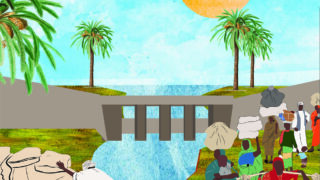It is now certain that South Sudanese President Salva Kiir Mayardit will not attend the ceremony about the re-exportation of his country’s first oil shipment through the Sudanese Bashaer Port. South Sudan has been cut off from the global oil markets after its government decided to stop oil production in January 2012. Will there be a ceremony or any oil exportation? Today, interests will determine whether there will be a break up or a settlement.
The quarrels between the two Sudans over oil issues, oil transit fees, border demarcation, the Abyei region and support for armed insurgencies have almost led to war between the two countries. Although a direct war has so far been avoided, the tension-causing factors are still there and are being manifested through proxy wars and boycotts.
Sometimes, the relationship suddenly normalizes within the framework of common interests, the most prominent of which is the oil industry: South Sudan needs Sudan’s oil infrastructure — from processing centers, pipelines and ports of export — to deliver the oil; on the other hand, Sudan needs South Sudanese oil.
Exportation, no exportation
Despite the cooperation agreements signed between the two countries in September 2012, the most prominent of which was the agreement on oil, political problems and security concerns sabotaged the implementation of all the agreements. Last month, after the Sudanese army liberated South Kordofan’s Abu Krashwla area, which was occupied by Sudan Revolutionary Front (SRF) rebels for weeks, President Omar al-Bashir told Juba to stop supporting the rebels or Khartoum will block the transportation of South Sudanese oil through its territory. Earlier this month, Sudan carried out its threat, which will become permanent unless mediators, led by the African Union, are able to reach a final arrangement between the two countries within 60 days.
If an arrangement is reached and South Sudanese oil is allowed to be shipped through the Bashaer Port, it would signal that the cooperation agreements are a success, and they can be a basis for a joint cooperation that will not be affected by politics.
But because of a long history of mistrust, Juba is still searching for alternatives to export its oil to be liberated from pressure by Khartoum. After oil production stopped early last year, South Sudan signed memoranda of understanding with Kenya, Ethiopia and Djibouti, on the construction of pipelines. One pipeline will go to the port of Lamu on the eastern border of Kenya, and another will pass through Ethiopia, which is landlocked, then to Djibouti to reach world markets.
Waiting for feasibility studies
But those were only memoranda of understanding, which still need a lot of work to become a reality. Feasibility studies have been done on various factors, such as the proposed route, cost and how to pay for the pipeline construction, which is not yet clear. So the new pipelines project seems more intended for political consumption than a serious project.
Before South Sudan seceded and became an independent state, the Japanese company Toyota announced that it was doing a study on how to transport South Sudanese oil to Kenya. In April 2012, Salva Kiir visited China. The highlight of his visit was when Chinese officials rejected Juba’s request that China partially finance and build the pipelines. The Financial Timesreported the Chinese as saying that China had contributed to building Sudan’s pipeline and that South Sudan should use it.
In the same month, Pagan Amum, South Sudan’s chief negotiator, announced that Toyota has completed the feasibility study for a pipeline that passes through Kenya and that financing and construction bids will soon take place. A year later, in March 2012, the South Sudanese Information Minister Barnaba Marial Benjamin said that his government contracted the German company IFC Consulting Engineers to prepare a feasibility study for the construction of a pipeline to export South Sudanese oil through the Kenyan port of Lamu. The company’s website stated that they got a contract to study the various export options and analyze the technical and economic aspects of the project. But the company did not set a time frame for the study. On June 1, Commerce Minister Garang Daenq announced that President Salva Kiir received a delegation from Toyota, which will build pipelines to the port of Lamu. He did not specify what the project will cost, how it will be financed, or when the work will begin.
According to initial estimates, both proposed pipelines — the one going to Kenya and the one going to Djibouti via Ethiopia — will cost between $3 and 4 billion each and take two to three years to build. But there is still a need for a detailed feasibility study to determine the course of the pipelines and how to overcome the geographic obstacles, which include swamps and terrain 2,000 meters [6,562 feet] above sea level. More importantly, there is the issue of expropriating and compensating for the land on which the pipelines will be built. Another issue is who should pay for the project: the companies building the pipelines or the oil companies that will use them. There is also a geostrategic issue: some South Sudanese leaders prefer that the pipelines pass through Ethiopia so as to gain Ethiopia’s support in Juba’s continual disputes with Khartoum.
Is it worth it?
That leads us to the central question about the size of the oil reserves in South Sudan and whether it is worth building those pipelines. According to estimates by the World Bank and the International Monetary Fund, unless there are new oil discoveries or there is a significant improvement in the percentage of oil that is extracted, South Sudan’s current oil reserves have reached their peak and will begin to decline in six to seven years.
In fact, there are indicators that the decline has already started. There was a drop in production in Alwihda province, where oil production started in 1999. Peak production of 350,000 barrels per day was reached in 2005, then production declined to 150,000 barrels per day in early 2012. Moreover, in the disputed Abyei region, which is rich in oil, oil production dropped from 11,000 to 3,000 barrels per day over the same period. According to experts, a comprehensive study of this kind needs at least five years to complete.
A promising region that is believed to contain new oil reserves is Area B in Jonglei State. Foreign companies have been interested in Area B since the 1980s, when a consortium led by the French company Total, and included the American Marathon Oil Company and the Kuwait Oil Company, were allowed to work in that area. In 1983, Total stopped its work there because of the outbreak of the second civil war. The company renewed its contract in 2004, when it became clear that a peace agreement would be signed between the government of Sudan and the Sudan People’s Liberation Movement (SPLM). The peace agreement was signed in 2005.
Three reasons behind the disruption
In the past nine years, there has been little progress toward drilling one well to know the size of the oil field and the expected production. This was due to three main reasons:
1. The legal dispute between Total and the White Nile Petroleum Operating Company. The latter established a partnership with the SPLM (governing South Sudan) and a small British company. In 2007, a political intervention reassigned the contract to Total. At the time, it became clear that South Sudan was on its way to secede and become an independent state. So work slowed down till a clearer political picture emerged.
2. The security situation. Jonglei’s security situation has become the worst in South Sudan, where the concession area is large, at 120,000 square kilometers. Jonglei suffers from many tribal disputes and rebel groups have started challenging the SPLM’s control. Last month, Total’s oil exploration operations stopped after a group led by renegade David Yau Yau captured the Boma military garrison. Ironically, it was the first region that the SPLM seized when fighting the Sudanese government in the 1980s.
3. The South Sudanese government exercised its sovereign powers and divided Area B into three areas. The first was given to the consortium led by Total and the other two were offered to other companies, but nothing has been finalized. Total has not yet said how it will react to that move, but it seems difficult for Total to legally challenge that decision because Juba was exercising its sovereign powers.
Others have oil too
On the other hand, building a pipeline to transport South Sudanese oil to the outside needs to take into account what has been taking place in the oil industry in the East African region. Oil and gas fields have been discovered in Uganda, Kenya, Mozambique, Tanzania and Madagascar. It is believed that Mozambique will be the first country to export gas, followed by Tanzania. International companies such as ExxonMobil (US), Statoil (Norway) and the China National Petroleum Corporation are involved.
Uganda appears to be in a better position in terms of the volume of oil discoveries, as assessed by Tullow Oil, a British company. Tullow made smaller discoveries in neighboring Kenya. But like South Sudan, Uganda is a landlocked state. The Ugandan president is opting for oil refining instead of exporting crude. Juba is doing the same; it has signed agreements to create two small refineries to meet domestic needs.
So it seems that in addition to technical factors, the size of the oil reserves and the expected oil production — to which Juba is trying to find alternative transportation routes to end its dependence on Khartoum — East African political factors are also raising sensitivities. Kenya, Ethiopia and Uganda have political and strategic calculations that make finding an outlet to South Sudanese oil inevitable, at least for the foreseeable future.
Translated by Al-Monitor



